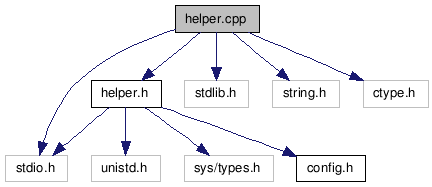helper.cpp File Reference
Implementation of helper.h. More...
#include "helper.h"
#include <stdio.h>
#include <stdlib.h>
#include <string.h>
#include <ctype.h>
Include dependency graph for helper.cpp:

Defines | |
| #define | ISALPHA(x) (isalpha(x)||(!isascii(x))) |
| Is char from alphabet? It could be alpha or nonascii. | |
| #define | ISBLANK(x) (isblank(x)) |
| Is it blank? | |
| #define | ISDIGIT(x) (isdigit(x)) |
| Is it digit? | |
| #define | MAXWORD 255 |
| Initial length of word buffer. | |
Functions | |
| char * | getword (FILE *input, unsigned int *occurrences) |
| Function that reads one word from input file. | |
| int | sgetch (CHAR *where, const char *from) |
| int | ustrlen (const char *arg) |
| Gets one character from string. | |
Variables | |
| bool | numbered |
| Are occurrences included in input file? | |
| unsigned int | maxlen |
| Maximal length of prefix. | |
Detailed Description
Implementation of helper.h.
Function Documentation
| char* getword | ( | FILE * | input, | |
| unsigned int * | occurrences = NULL | |||
| ) |
Function that reads one word from input file.
It returns pointer to that word. Be aware! This pointer points to static buffer inside the function, so you shouldn't care about it's deallocation. It's little bit weird, but I never need two words in memory, so why to bother with some allocation and deallocation ;-)
References CHECK_PTR, ISALPHA, ISBLANK, ISDIGIT, MAXWORD, numbered, and VWPRINTF.
Referenced by compute_stats(), and find_it_thread().
| int ustrlen | ( | const char * | arg | ) |
Gets one character from string.
Reason why is this function important is utf-8. Because in case of utf-8 one character does not necessary means one byte.
 1.5.7.1
1.5.7.1